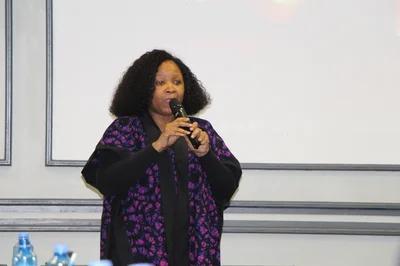Africa-Press – Lesotho. The Ministry of environment and forestry, through Lesotho Meteorological Services, hosted a mission from the Green Climate Fund (GCF), with the purpose of strengthening cooperation between the government of Lesotho and the GCF by engaging key government institutions, civil society organisations, as well as the private sector, on issues of climate finance access, programming, and alignment with national development and climate priorities.
Speaking at the meeting the Regional Manager, African Department, Chihenyo Kangara in her remarks said that the set up by the United Nations Framework Convention on Climate Change mandated is to serve the Paris agreement in supporting developing countries in their transitions and aspirations towards low carbon resilient development trajectories, and also serve as a hub for climate finance landscape.
Highlighting that the focus of their visit to Lesotho was to analyse the climate finance landscape in Lesotho, and what they can do to expand it so as to meet the needs and priorities of the country.
GCF an open partnership organisation, with over 200 Accredited Entities and delivery partners who work directly with developing countries for project design and implementation.
Their partners include international and national commercial banks, multilateral, regional and national development finance institutions, equity funds institutions, United Nations agencies, and civil society organisations.
This open partnership enables the Fund to foster unprecedented coalitions between private investors, development agencies and civil society organisations to achieve transformative change and support harmonization of standards and practices.
The civil society organisations representative within the National climate change committee, Mampho Thulo, outlined the structure of the NCCC, and its coordination.
“This initiative started around 2013, That is when we started to develop the terms of reference for the NCCC. Since that time, NCCC has grown into a semi-formal platform which is doing a great work. It is now roughly around 40 members. We have relevant government ministries represented, and then we have representatives from civil society, we have representative from private sector, we have representatives from the farmers’ union, and we also have development partners, last but not least, we have representatives from institutions of higher learning,” said Thulo.
“So, it is such a big group, but very important stakeholders to make sure that we are really inclusive and everyone is represented.”
She further explained that the reason behind such inclusivity is due to the reality of climate change in Lesotho and their struggle with it since 2013. This has made the NCCC to turn into a platform where even international partners that want to implement climate change initiative in Lesotho can go through them and they manage them and do recommendations even before they present their projects before the GCF.
Marealeboha Boutu, from the Lesotho Meteorological Services, highlighted some of the milestones Lesotho has achieved in terms of getting ready to address climate change.
“Our journey started in 1995 when we signed the protocol, in 2007 we developed the National Adaptation Program of Action which identified the immediate needs as a least developed country on which areas we should try and address issues related to climate change. So, the NAPA has been our guiding tool since then until today, while we still do not have the national adaptation plan in place.”
She further explained that in 2017 the National Climate Change Policy was created, as well as the NCCP strategy. In the same year, Lesotho also submitted is first Nationally Determined Contributions, which represent its commitments to reduce greenhouse gas emissions and adapt to climate change. They were agreed to by countries during the Climate Change Conference of the Parties (COP) in Paris in 2015, a commitment known as ‘The Paris Agreement’.
“So, in terms of the GCF country program that we developed in 2022, we came up with five priority areas. The priority areas are more inclined to land issues because that is where we have the biggest challenge,” Said Boutu.
The priority areas included restoring catchments and landscapes in Lesotho for climate resilience, promoting sustainable development of Lesotho’s catchments to build resilient communities and ecosystems, strengthening agricultural productivity through enhanced access to renewable energy resources for productive use, integrated water resource development to build resilience of vulnerable communities, and finally rangeland management.
For More News And Analysis About Lesotho Follow Africa-Press






